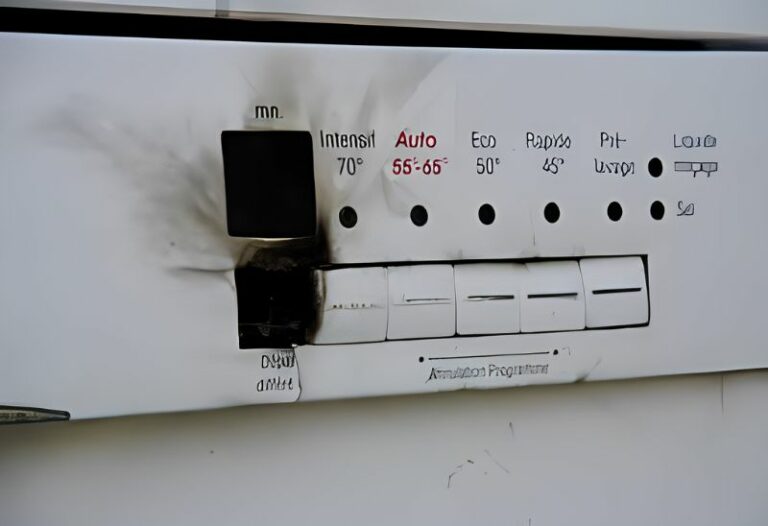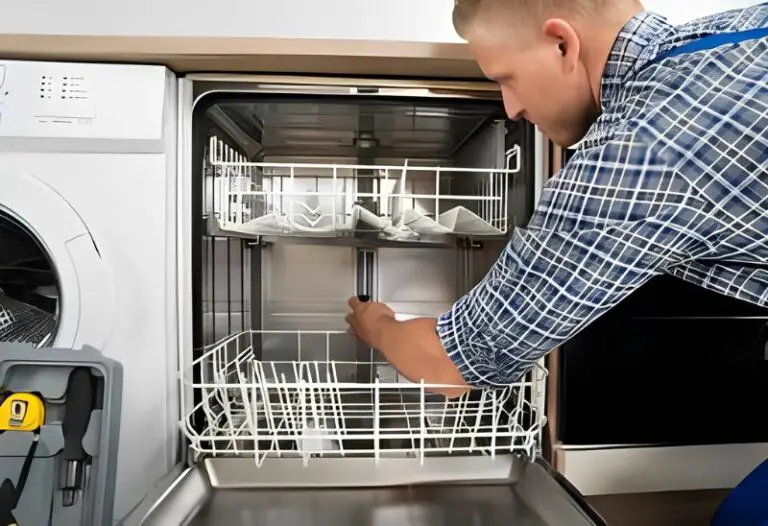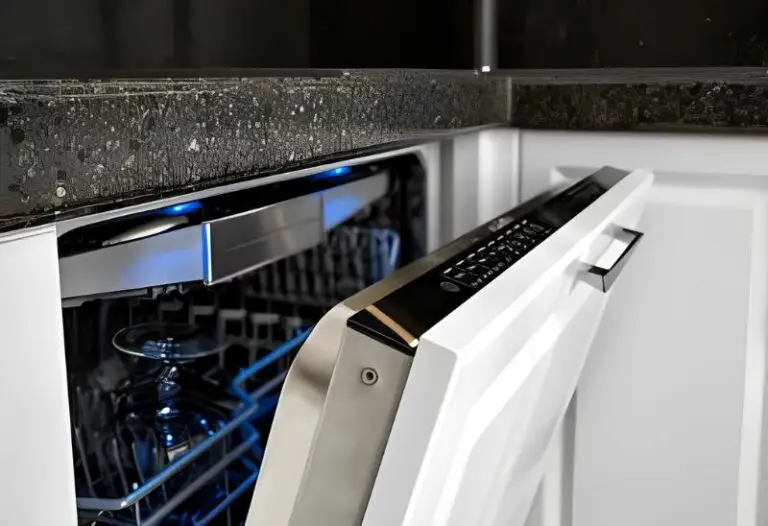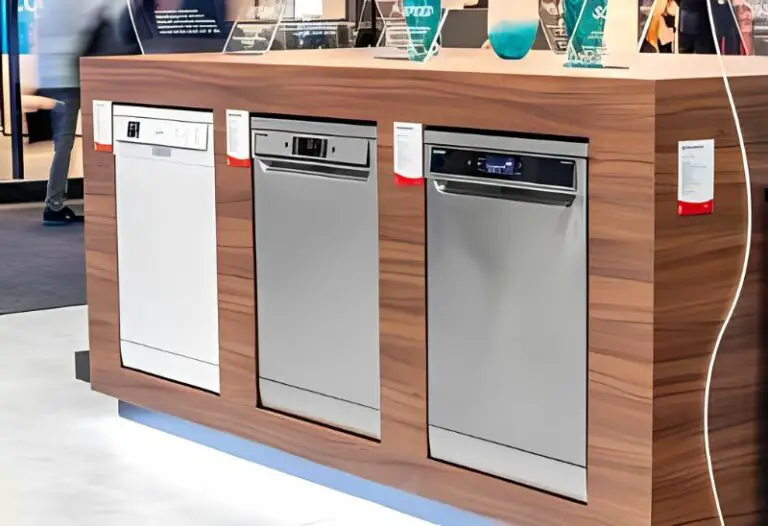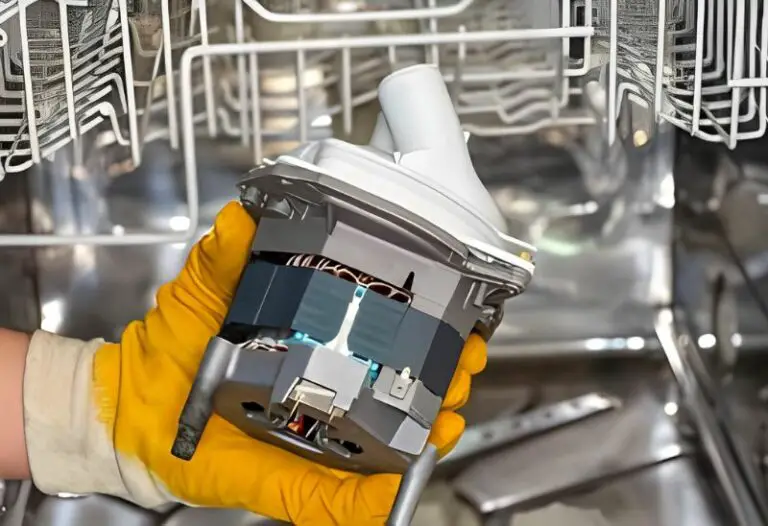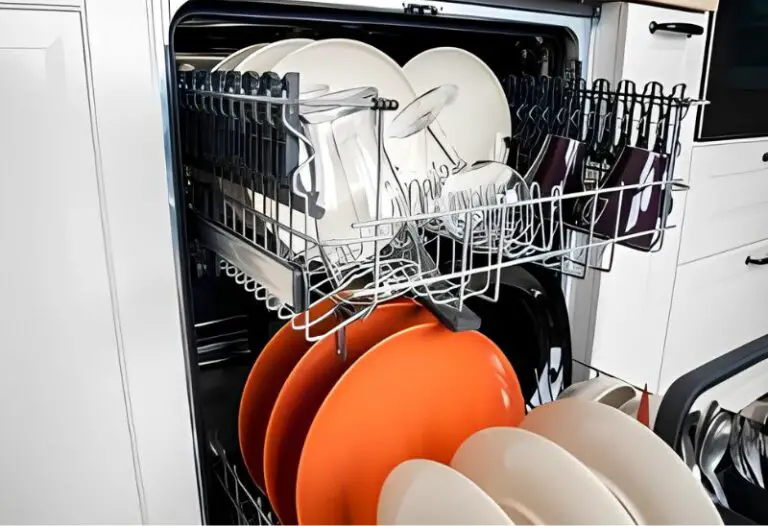Have you ever opened your dishwasher after a cycle only to find that the water is brown and murky? It can be quite alarming and leave you wondering whether it’s safe to use your dishes or not.
But what causes brown dishwasher water in the first place? And how can you fix it?
In this article, we’ll explore the different causes of brown dishwasher water and provide you with some effective solutions to get your dishwasher running smoothly again. So, read on to find out more!
Key Takeaways
- Brown water in dishwashers is often due to hard water, mineral deposits, mold, pipe corrosion, or plumbing issues.
- Solutions include using a water softener, regular cleaning, pipe replacement, or professional plumbing services.
- Regular maintenance of plumbing and the dishwasher can help prevent the reoccurrence of brown water.
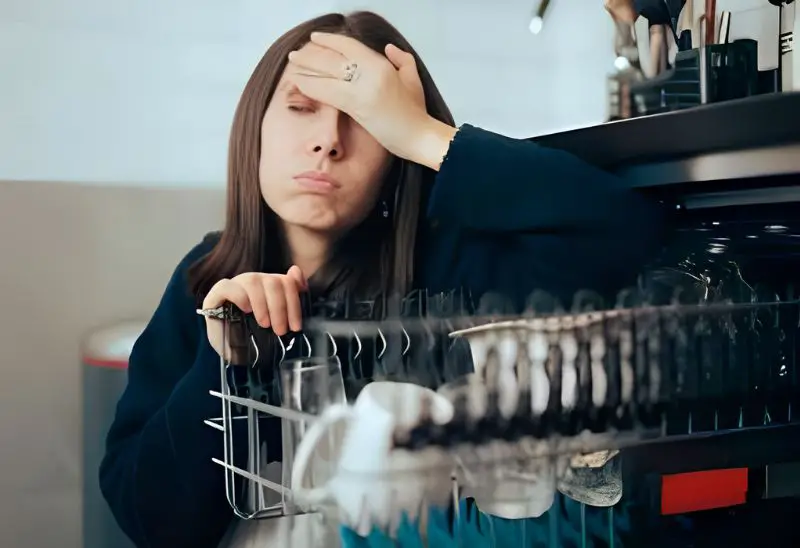
Brown Dishwasher Water Common Causes #1: Hard Water
Ever opened your dishwasher to find brown water or stains? You’re likely dealing with hard water. Hard water contains high levels of minerals like calcium and magnesium, which can leave your dishes and dishwasher with a less-than-appealing tinge.
What’s Happening Inside Your Dishwasher?
- Residue Accumulation: The minerals in hard water can form a residue on your dishes and the interior of your dishwasher—a telltale sign you have hard water.
- Detergent Battles: Minerals in the water reduce the effectiveness of your detergent. Without a good lather, your dishwasher has to work harder, and still, dishes don’t come out quite clean.
- Appliance Lifespan Threat: Scaling from mineral deposits might just clog or damage your dishwasher’s inner workings over time.
A Speck of Prevention
Don’t worry; you’ve got options to prevent hard water woes:
- Install a Water Softener: Say goodbye to those minerals and hello to clearer water.
- Dishwasher Salt or Additive: These are specially designed to minimize mineral buildup.
- Adjust Built-In Water Softener: If your model has one, tweak it to match your water hardness.
Brown Dishwasher Water Common Causes #2: Mineral Deposits
Brown stains in your dishwasher are often caused by mineral deposits that come along with the water. They can be stubborn and hard to remove, like unwanted house guests.
Mineral Buildup: The Usual Suspects
- Iron & Manganese: These two are best buddies when it comes to staining. They love hanging out in your water, and when they get cozy in your dishwasher, they leave a telltale brown tint.
- Water Hardness: If your home is the stage for hard water, it’s like a VIP pass for mineral accumulation. Calcium and magnesium, in particular, love to crash the party.
Now, don’t fret. You’ve got several at-home remedies that can handle these minerals:
- Vinegar Cycle: Just pour it into the detergent dispenser and run an empty cycle. It’s like a spa day for your dishwasher.
- Citric Acid Magic: A little of this citrusy powder can work wonders.
- Baking Soda Blitz: Another kitchen staple that doubles as a cleaning agent.
Or you can freestyle with a commercial cleaner specifically designed to make those minerals disappear.
Brown Dishwasher Water Common Causes #3: Mold
Ever opened your dishwasher to find brown stains on your dishes? Well, often, the culprit is mold. This sneaky little fungus loves the kind of spa retreat your dishwasher offers: warm, moist, and filled with tasty food debris for a fungal feast.
Here’s why mold might be throwing a brown-stained party in your dishwasher:
- Mold Growth: Mold can form brown, black, or green spots or streaks in places where water and bits of food linger. Check the corners and crevices where it can hide.
- Musty Odors: Does your dishwasher smell like a damp basement? That’s mold chatting you up with its signature musty hello.
But don’t fret! Here’s how you can evict that unwanted fungus:
- Sunshine Clean: Run your dishwasher on a hot cycle with a cup of vinegar in the top rack. Mold despises the acidic chit-chat of vinegar.
- Wipe Out Routine: After each cycle, leave the door ajar. Wipe the gasket and any suspicious nooks with a damp cloth—think of it as mold’s kryptonite.
- Cleaning Agents:
- Bleach: Marvelous for white interiors, but avoid it if your dishwasher is stainless steel.
- Vinegar: Your go-to, all-natural mold adversary.
Brown Dishwasher Water Common Causes #4: Pipe Corrosion
If you ever opened your dishwasher to find the water has a brown tinge? Pipe corrosion might just be your unwelcome guest.
Why do pipes corrode? It’s a bit like asking why a bike left out in the rain gets rusty. Over time, your plumbing system ages, and the interaction between water quality, pH, and oxygen levels, or even certain bacteria, can wear down the pipes. The result? That pesky corrosion.
- What does corrosion look like? Brown, rusty water
- Cloudy appearance
- Metallic taste or odor
- Visible particles floating around
When iron from corroded pipes mixes with water, it leaves those unsightly brown stains in your dishwasher. It’s like your pipes are shedding, but instead of fur, it’s flakes of rust.
Can it be fixed? Absolutely! Here’s what you can do:
- Replacement: Swap out those old pipes for new copper, plastic, or stainless steel ones. Just like getting a wardrobe update!
- Corrosion Inhibitors: Think of these as a protective coat for your pipes, guarding them against future decay.
Brown Dishwasher Water Common Causes #5: Plumbing Issues
Plumbing issues can be sneaky culprits behind this murky problem. Let me guide you through some common ones.
Clogged Drains: Your dishwasher’s draining system loves to play hide and seek with food particles and grease. Over time, they build a clog that’s as stubborn as a stain on your favorite shirt. To check:
- Inspect the drain hose for blockages
- Clear out any debris you find
Faulty Valves: The water inlet valve serves as a gatekeeper, deciding how much water enters your dishwasher. If it’s on the fritz, brown water can be an unwelcome visitor. Look for:
- Signs of corrosion or damage
- Malfunctioning valve (is it sticking?)
Leaking Hoses: These sneaky snakes can drip or burst, making a mess and tinting your water brown. Are there any wet spots or puddles under your dishwasher? That’s your clue.
Improper Installation: If someone played fast and loose while installing your dishwasher or plumbing system, issues might arise. Pipes might be improperly aligned, or the dishwasher may not be leveled, affecting drainage.
Still stumped? It might be time to bring in a pro. A licensed plumber or expert technician can swoop in to save the day. They’ll zero in on the issue, whether it’s a subtle leak or a full-blown clog, and get your dishwasher back in tip-top shape.
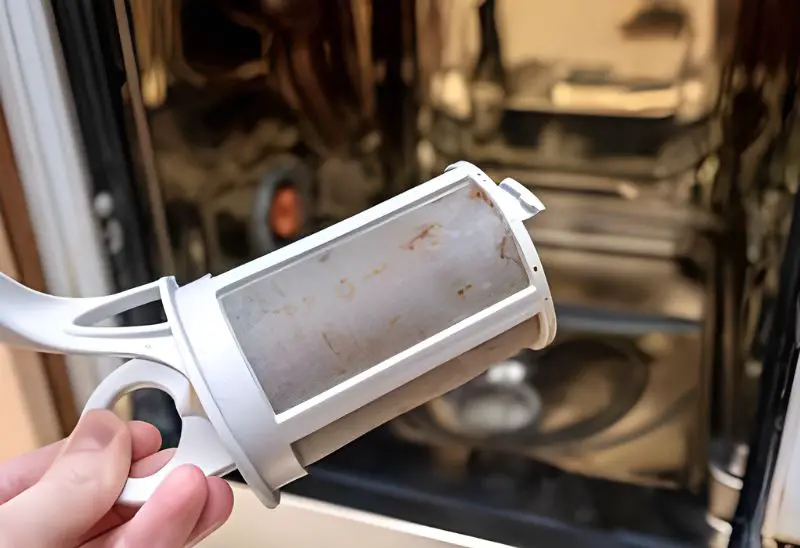
Possible Solutions #1: Install a Water Softener or Use a Dishwasher Salt
Ever opened your dishwasher to find the water a little… brown? You’re not alone! Often, that pesky discoloration is thanks to hard water, which is teeming with minerals like calcium and magnesium. But fear not; a solution is at hand!
Water Softener Imagine your dishwasher performing at its absolute best, with sparkling clean dishes every time. A water softener could be your kitchen’s new best friend! Here’s how it works:
- It swaps out the minerals in hard water with sodium or potassium ions.
- This means less limescale and mineral accumulation, keeping your dishwasher happy.
Dishwasher Salt But what if you’re not ready to commit to a full-scale water softener system? Dishwasher salt is your go-to:
- It targets the water softener unit in your machine, dissolving gradually to fight off minerals.
- Picture clear water and unblemished crockery—the hallmark of a well-maintained kitchen.
Setting It Up
- First things first, check your local water hardness.
- Grab a water softener or dishwasher salt that fits your needs and wallet.
- Install the Softener or toss in the salt following the maker’s guide.
Adjustments & Maintenance
- Tweaking settings on both the Softener and dishwasher ensure optimal performance with your chosen detergents.
- And why not run a cleansing cycle with vinegar or citric acid? It’s great for kicking any mineral hangers-on to the curb.
Possible Solutions #2: Clean the Dishwasher Regularly with a Natural or Commercial Cleaner
A straightforward solution is to give your dishwasher some love and attention with regular cleaning. Here’s a quick guide:
Natural Cleaners:
- Vinegar: An ace at cutting through grease and lightening up those hard water stains.
- Baking Soda: Perfect for a gentle scrub and deodorizer.
- Citric Acid or Lemon Juice: Fantastic for dissolving mineral buildup and adding a fresh scent.
Commercial Cleaners:
- Specially crafted to tackle tough grime and food remnants.
- Often comes with added power to combat mold and mineral deposits.
How to Use These Cleaners:
- Prepare the Dishwasher:
- Remove the filter and spray arms.
- Please give them a good wash in the sink with hot, soapy water.
- Wipe It Down:
- Clean the door, tub, racks, and door gasket using a damp cloth or sponge.
- Run a Cleaning Cycle:
- Place your cleaner, be it natural or commercial, in the detergent dispenser.
- Set your dishwasher to a hot cycle and let it run empty.
A pro tip, you? Do this at least once a month. And if you’re dealing with hard water, or if you notice residue building up sooner, consider increasing the frequency.
Clean The Dishwasher Regularly With A Natural Or Commercial Cleaner
Let’s talk about how you can get your dishwasher back to its shiny state by cleaning it regularly with either a trusty natural solution or an effective commercial cleaner.
First things first, remember regular maintenance is key. This includes giving your dishwasher filter some love. It’s a simple task:
- Remove the filter.
- Rinse it under warm water.
- Gently scrub with a soft brush.
Alright, with your filter taken care of, let’s dive into the cleaning solutions. Vinegar is the unsung hero of natural cleaners, and it’s perfect for your dishwasher. Here’s a quick method for a vinegar wash:
- Start an empty hot water cycle.
- Pour one cup of white vinegar into the bottom of the dishwasher.
- Let the cycle run its course.
Table: Natural Cleaning Solutions
Ingredient Use
Vinegar Breaks down residues
Baking Soda Absorbs odors, gentle abrasive
Citric Acid Removes hard water stains, natural descaler
Another great natural option is baking soda. Just sprinkle a cup at the bottom of the dishwasher and run a short hot water cycle. It’ll not only clean but also deodorize. Is citric acid more your thing? It’s fabulous for tackling those hard water deposits that could be causing the brown water issue.
Possible Solutions #3: Replace the Corroded Pipes or Use a Corrosion Inhibitor
Have you noticed your dishwasher water turning brown, and it’s got you puzzled? It’s likely due to rust and corrosion in your pipes. This is not only unappealing, but it can also shorten the life of your plumbing system. Don’t worry; we’ve got a couple of solid solutions for you!
Step-by-Step Repair or Replacement
First, you want to check your pipes for any signs of trouble. Here’s how you can tackle the situation:
- Inspect: Look for rust, corrosion, or leaks.
- Assess: Is the damage minor, or are we talking about a major overhaul?
- Decision Time: For severe damage, it’s best to leave the job in the hands of a professional plumber. Less severe? Consider a corrosion inhibitor.
Choosing a Permanent Solution: Pipe Replacement
Replacing the corroded pipes is like giving your dishwasher a fresh start. New pipes made of copper, plastic, or stainless steel provide resistance to rust and corrosion and are a long-lasting fix.
Choosing a Temporary Solution: Corrosion Inhibitor
If the situation isn’t dire, a corrosion inhibitor can be a great temporary fix. It’s like a shield for your pipes, preventing further damage.
- Compatibility Check: Make sure the corrosion inhibitor you choose works with your setup.
- Application: Follow the instructions to add it to your water supply.
Possible Solutions #4: Troubleshoot the Plumbing Issues or Call a Professional
It might just be a quirky plumbing issue that you can tackle. Let’s roll up our sleeves and look at some DIY checks:
- Examine the Drain Hose: Peek under the sink and give that drain hose some attention. Is it kinked like a garden hose left out all summer? Straighten that curve! Also, look for clogs or leaks. Ensure it’s snug with the sink drain or garbage disposal to avoid any mishaps.
- Inspect the Water Inlet Valve: Is your dishwasher thirsty? Check the valve for debris or signs of wear. Make sure it’s open as wide as possible, allowing a good flow of water. Is the water pressure low? It might be time for a little TLC.
- Give the Circulation Pump a Once-over: Hear any strange sounds? It could be the circulation pump crying out for help. Check for signs of leaking or wear. It should be running smoothly without making a fuss.
- Assess Wash Arms: Do the wash arms look like they’ve gone a few rounds with a boxer? Cracks, holes, or clogs will affect performance. They should be free-spinning and spraying water with grace.
If you’re the adventurous type and handy with tools, you might fix minor issues on your own.
However, if DIY isn’t your cup of tea or the problem seems complex, it’s time to dial a professional. Whether it’s a plumber to weaves their magic on your plumbing system or an appliance technician to charms your dishwasher parts, they’ll handle the repairs or replacements with ease.
Frequently Asked Questions
Dishwasher troubles got you down? You’re not alone! If you’re dealing with brown dishwasher water, these FAQs can help clear things up and get those dishes sparkling again.
What could be causing the brown stains inside my dishwasher?
Brown stains in your dishwasher could result from hard water, which is loaded with minerals like calcium and magnesium. They can cause buildup and stains. Using a water softener may alleviate this issue.
Is it safe to use my dishwasher if it leaves an orange-brown residue?
While an orange-brown residue might not be immediately harmful, it could indicate an underlying issue, such as a failing seal or corroded pipes. It’s best to investigate and fix the problem to ensure your dishwasher is safe for use.
What steps should I take to clean and maintain a dishwasher free from brown residues?
Keeping your dishwasher free from brown residue involves routine cleaning and maintenance. Regularly clean the filter and drain basket, ensure the drain hose is clear, and run an empty cycle with a dishwasher cleaner.
Are there any health risks associated with washing dishes in a dishwasher that has brown water?
Brown water may contain minerals, rust, or other contaminants. While not typically dangerous, it is wise to avoid using the dishwasher until you have addressed the issue, as these contaminants could adhere to dishes.
Why are my dishes coming out with brown spots, and how can I prevent this?
Brown spots on dishes often result from food particles, minerals, or a malfunctioning appliance. Prevent this by cleaning the spray arms, using rinse-aid, and ensuring your dishwasher is in good working repair.
What are some common reasons for a dishwasher to have dirty water at the end of a cycle?
Common reasons for dirty water at the end of a cycle include a clogged drain or filter, a blocked water inlet valve, or a malfunctioning pump. Regular maintenance and checks can prevent these issues.
